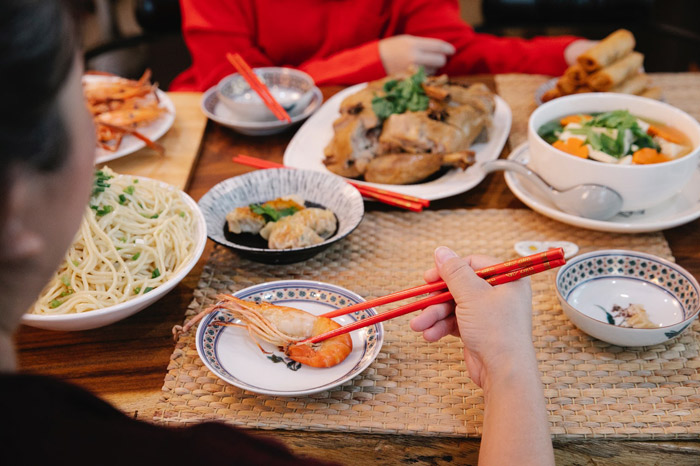近年来,全社会都在提倡使用公筷。
一想到公筷这个词的英译,你脑子里是不是就会冒出“public chopsticks”?但这个表达并不正确。
“公筷”指的是“一起吃饭的人把餐食从盘子里夹到自己碗里使用的筷子,有别于自己的筷子”,如果翻译为“public chopsticks”就会被认为是“任何人都可以用来吃饭的筷子”。
英文中有一个词“serving”,作名词用表示“一份食物”,相当于“helping”(一份、一客),其作形容词用则可以表示:
for use in distributing food or drink
用以分配食物或饮品的
所以公筷就是“serving chopsticks”,类似地,“公勺”就是“serving spoon”,餐饮的“托盘”是“serving tray”。
像“公筷”这样看似简单、但翻译起来容易跑偏的流行热词还有很多。
 [Photo/Pexels]
[Photo/Pexels]
赖床
lie in
在《柯林斯英语词典》里,对lie in的释义是remain in bed late in the morning,也就是赖床。
这里稍微区分一下“赖床”和“睡懒觉”,“睡懒觉”是“早上睡到很晚才醒来”,而“赖床”则指“醒来赖在床上不起”,“睡懒觉”的英文表达可以是get up late或sleep in。
另外,sleep late不是“睡得晚”,而是“起得晚”。海明威的《老人与海》里就有一句“Young boys sleep late and hard.”
例句:
On one occasion in Palm Beach, Rose, irked by Jackie's penchant for sleeping late, inquired of Mary Gallagher, who was Rose's secretary, if Jackie was coming down soon.
有一次在棕榈海滩,罗斯对杰基喜欢睡懒觉的习惯感到很恼火。罗斯问自己的秘书玛丽·加拉格尔,杰基是否很快就下来。
刷存在感
assert oneself
online Merriam-Webster上这样解释assert oneself:
to speak or act in a manner that compels recognition especially of one's rights.
以某种方式说或者做,以表明自己的权利应该得到承认。
这个用法很难给出一个对应的中文词汇。《英汉大词典》给出的释义是“坚持自己的权利或意见;迫使人们承认自己的权利;显示自己的权威”。这个用法在某种意义上含有现在经常使用的“刷存在感”的意思。
例句:
England did not lose her Englishness because an Age of Elizabeth was followed by an Age of Queen Anne and a Victorian Era. It was because the English were so much themselves that different standards and different national moods could assert themselves in different generations.
英国没有因为伊丽莎白时代之后有安妮时代和维多利亚时代而失去其特征。这是因为英国人那么有自己的特点,所以不同的标准和不同的民族情绪在不同的时代会以某种方式体现自身的存在。
杠精
cantankerous
Cantankerous [kænˈtæŋkərəs] 是一个形容词。在生活中,我们常会遇到这样一些人,无论你说什么或者做什么,他们总爱唱反调,这个词说的就是这样的情况。
Collins online Dictionary给出的解释就是指日常说的“杠精”。
Someone who is cantankerous is always finding things to argue or complain about.
爱找茬,爱抱怨。
例句:
His dad's got a big, pink marshmallow heart. But he buries it determinedly beneath a cantankerousness that comes from being old, lonely, and struggling to cling to meaning in his life.
他的爸爸有一颗大大的、粉色的、像棉花软糖一样的心脏,但却毅然决心把它埋藏在年老、孤独和拼命抓住活着的意义而产生的抱怨之下。
话虽如此
that said
That said实际使用中已经很常见,但许多词典里都查不到。
Merriam-Webster给出的英文解释是:despite what one just said,其实就是despite what was said。
Longman Dictionary of Contemporary English Oniline有一个having said that的用法,给出的释义为:something is true in spite of what you have just said,意为“尽管这么说,但事实却如此”。
Having said that显然是比较早的用法,用分词引导一个条件句,现在很少使用,而由其演化而来的that said成了广泛用法,也用that being said。
例句:
Ms Ma is particularly high profile and well connected. He would have understood how inflammatory it would be. That said, it is not unprecedented.
马女士身份特别显赫,人脉也很广。他应该明白这案子会引起多么大的反应。话虽然这么说,类似的案件并不是没有先例。
紧身
figure-hugging
Figure这个词有“形体”的意思,figure-hugging是紧贴着身体的,贴合身材的,跟中文的“贴身”在思维方式上很贴近。
Figure-hugging是英式英语的用法,美式英语里常用form-fitting或者formfitting。
还有一个意思相近的词close-fitting,表示“非常合身”,比如a close-fitting jacket(非常合身的外套)。
例句:
The winners were announced at the end of a gala night of parade in figure-hugging swimsuits and shimmering evening gowns in the US$10 billion Figali Convention Center on the banks of the Pacific entrance to the Panama Canal.
在太平洋通往巴拿马运河入口处岸边造价100亿美元的费加利会议中心,盛大的狂欢游行活动即将结束时,主办者宣布了获奖者名单,获奖者都穿着紧身泳衣或金光闪闪的晚礼服。
门面
adornment
Adornment的意思是“装饰品”。
Free Dictionary给出了两个解释embellishment, ornamentation,就是“抽象意义上的门面或者脸面”。
She had managed to instill in her household a European sense of children as graceful adornments to the parents, as opposed to our ugly American democratic style, with even an infant given his noisy vote in all proceedings.
她极力在自己的家里培养欧洲意义上的孩子,从而使他们成为父母的一种体面的装饰,而不像我们丑陋的美国民主生活作风,即使婴儿也可以通过哭喊对许多事表达他们的意见。
其实,地道的英文翻译来源于足够的阅读积累。你还知道哪些巧妙的翻译呢?
(来源:中国日报双语新闻微信 编辑:陈月华 左卓 丹妮)







